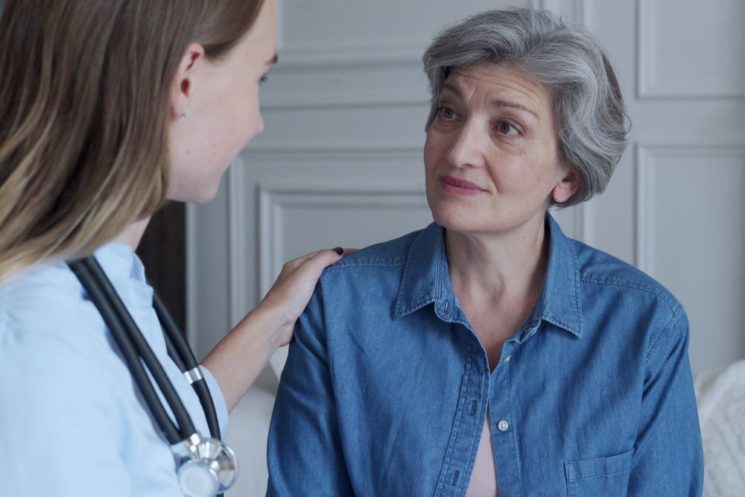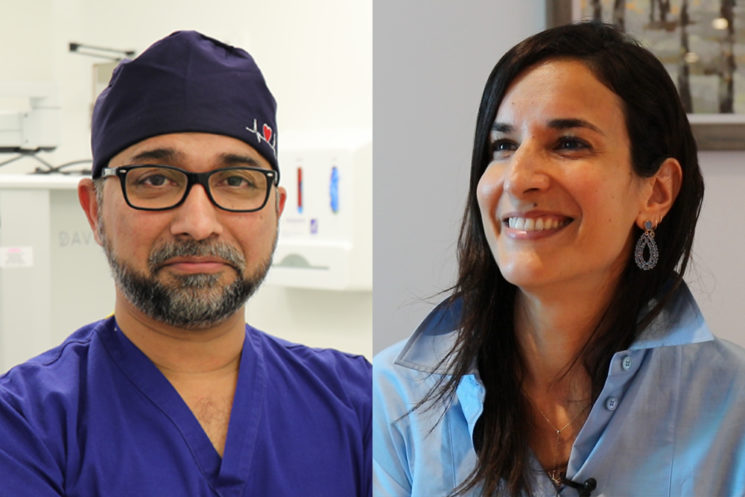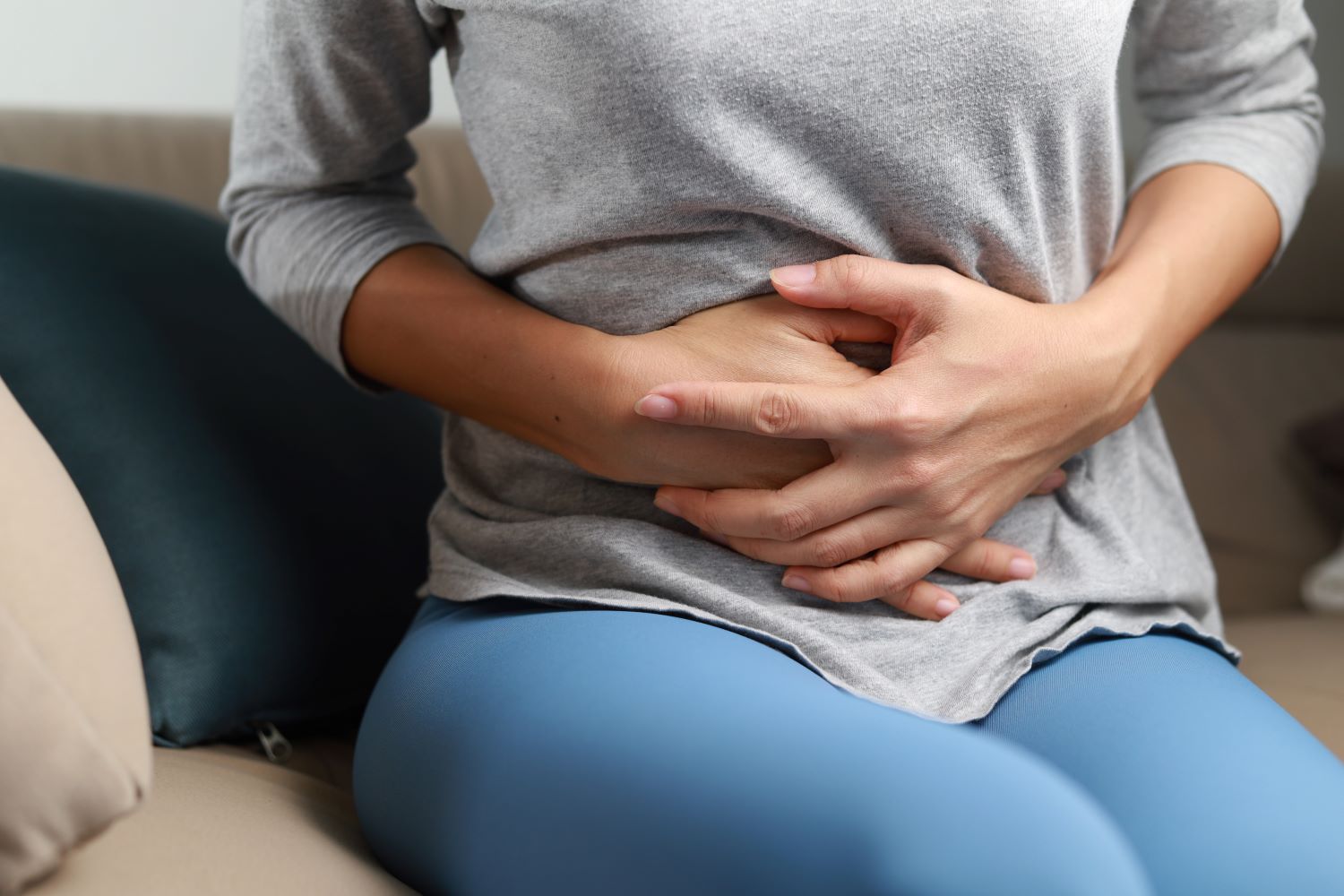
In this blog, gynaecologist Miss Maya Al-Memar answers some of the most common questions we receive from patients surrounding endometriosis – from symptoms through to diagnosis and treatment.
Endometriosis symptoms
Q: Can endometriosis cause persistent coldness?
A: It is unlikely that endometriosis would cause you to feel constantly cold. We recommend you book an appointment with a GP to investigate this symptom further.
Q: Is it normal to pass blood clots and/or mucus if you have endometriosis?
A: Yes, it is normal to pass blood clots and/or mucus if you have endometriosis.
Endometriosis often causes patients to have heavier menstrual bleeding than usual, which can lead to large blood clots being passed. These clots may be dark red or brown in colour, and thick, lumpy, stringy, or jelly-like in consistency.
Heavy periods can occur in women without endometriosis and may be associated with other benign conditions such as uterine fibroids and adenomyosis.
Q: If you have endometriosis in the bowel, is it common to pass mucus when having a period?
A: Bowel endometriosis, also known as recto-vaginal endometriosis, is when endometrial tissue grows on the surface or inside the intestines or rectum, and sometimes in other parts of the bowel.
In addition to the typical symptoms of endometriosis, women with bowel endometriosis may experience mucus in their stools and rectal bleeding during their period.
Q: My periods aren’t consistently bad, but I still have tugging, pelvic pain, and bowel issues. Could this still be endometriosis?
A: Yes, it is possible to have endometriosis without having consistently bad periods.
Symptoms of endometriosis vary depending on the individual and may also fluctuate according to the menstrual cycle. Occasionally, some women show no symptoms at all.
Severe pelvic pain and bowel issues are both classic symptoms of endometriosis. Some patients experience this pelvic pain as something ‘tugging’ or pulling on their internal organs.
However, there are causes of these symptoms that are not related to gynaecology and endometriosis, such as bowel conditions. It is important to see your doctor who will assess this and arrange investigations to understand the underlying cause.
Q: I've just been diagnosed with an endometrial polyp. Is this typically cancerous and what treatments are available?
A: An endometrial polyp is a small overgrowth of tissue that is attached to the inner wall of the uterus (lining of the womb). Most polyps are benign (non-cancerous), but it is important to have them checked to be certain.
Treatment depends on the size and severity of the polyp. If your polyp is small and causing no symptoms, you may be advised to watch and wait. Otherwise, a polyp can be removed surgically via a hysteroscopy.
A hysteroscopy is a small procedure where a small, thin tube with a small camera inside it is inserted into the cavity of the womb, through the vagina, which can be preformed awake as an outpatient procedure or under general anaesthetic.
The removed polyp will then be tested for cancer cells.
Causes of endometriosis
Q: Are we any closer to finding out the cause of endometriosis?
A: Unfortunately, we still do not know what exactly causes endometriosis. However, several theories have been proposed:
- Genetic predisposition
- Immune system dysfunction
- Exposure to toxins in our environment – notably a toxin called dioxin. Research has found that animals exposed to high levels of dioxin developed endometriosis, although this has not been proven in humans.
- Retrograde menstruation – when menstrual blood flows back through the fallopian tubes and into the pelvic cavity, rather than out of the body. The blood contains endometrial cells from the lining of the uterus, and these may become trapped and adhere to the pelvic walls and organs.
- Metaplasia – when a cell abnormally changes from one type to another type, often as a response to inflammation. This may partly explain why endometriosis cells appear spontaneously and within distant parts of the body.
Q: I've read stories online about parasites causing endometriosis. Is that true?
A: No definitive cause has been found as to why some women develop endometriosis and others do not; however, there are many theories, such as genetic predisposition, environmental causes, and immune dysfunction.
At present, there is no strong research to support the suggestion that parasites or a parasitic infection can cause endometriosis.
Q: I was diagnosed with endometriosis when I was 18 years old. How likely is my daughter to develop the same condition?
A: While endometriosis can run in families, this does not guarantee your daughter will develop it.
If your daughter begins to display symptoms, visit your GP for a referral to a specialist.
Diagnosing endometriosis
Q: How can I get proper testing and/or a diagnosis? My symptoms are being ignored by my GP.
A: To help your GP understand the impact your symptoms are having on your daily life, you should keep a symptom diary to show them. There is a useful resource for this on the Endometriosis UK website (linked below).
Ask your GP to refer you to a gynaecologist, either via the NHS or through your private health insurance. If possible, ask them for a referral to a consultant that specialises in endometriosis. If you are using private health insurance, you may be able to research endometriosis specialists beforehand (check that they will accept your insurer).
Ultrasound scan and MRI scan can help with diagnosis of endometriosis. If these are normal, it does not exclude endometriosis as a diagnosis. The definitive way to diagnose endometriosis is via laparoscopy, which will need to be carried out by a gynaecologist.
For more advice, please visit the Endometriosis UK website or download their symptom tracker.
Endometriosis treatment
Q: What treatment options are there apart from the coil, pill, or surgery?
A: Surgery, hormone pills, or the hormonal coil are the primary treatment options currently available for endometriosis. Every woman will respond to treatment differently, so it’s important to discuss the most suitable options for you with your consultant.
Anecdotally, some women may find that an anti-inflammatory diet helps alleviate some of their symptoms. This involves reducing intake of food known to trigger inflammation, such as caffeine, alcohol, refined sugar and carbohydrates, dairy, and processed meats. We recommend the Mediterranean diet.
For more advice, please see this leaflet regarding endometriosis and diet from the NHS.
Q: Will a hysterectomy prevent my endometriosis from coming back?
A: While a hysterectomy may effectively alleviate symptoms in some women, it is not a cure for endometriosis. In some cases, symptoms may persist or return following surgery.
Whether your endometriosis persists after surgery is dependent on multiple factors, such as whether your ovaries are removed and whether you decide to take hormone replacement therapy (HRT) after surgery.
Q: I think I have endometriosis in other, non-reproductive organs. Should I speak to my gynaecologist or ask for a referral to someone who specialises in those areas?
A: Extra-pelvic endometriosis is a very rare type of endometriosis where endometrial tissue grows in distant sites far from the pelvic organs, such as the lungs.
If you think you have extra-pelvic endometriosis, you should speak to your gynaecologist who will be able to refer you to specialists with relevant experience.
Q: Are there any circumstances where ablation of the endometrial tissue is preferable to excision? What are the risks of ablation?
A: Excision of endometriosis is a surgical procedure carried out under general anaesthetic. It involves using a long, thin instrument called a laparoscope to remove (excise) the endometrial tissue. At Cromwell Hospital, this is usually carried out robotically which often results in a faster recovery time. Excision is usually the most appropriate option for patients whose endometriosis has penetrated deep into their pelvic organs, as it allows for the removal of the full lesion.
Ablation is a minimally invasive procedure that involves the application of heat to destroy the endometrial tissue. This procedure is often used for superficial endometriosis that has not penetrated too far into the pelvic organs. However, one of the risks of ablation is that it can cause damage to underlying structures.
Your gynaecologist will explain to you prior to surgery the surgical technique applied.
Q: I don’t want to take any hormone medication for my endometriosis. What are non-hormonal alternatives?
A: At present, there are no non-hormonal medications available for the treatment of endometriosis, although research and clinical trials into such options are on-going.
The best non-hormonal treatment options for endometriosis are surgery, diet modification, and pain relief to manage symptoms.
Medications for endometriosis
Q: I'm interested in Zoladex for endometriosis. Is it worth it?
A: Zoladex is a medication which prevents estrogen from being produced in the ovaries – this is also known as a chemical menopause. Without estrogen, endometrial tissue growth will slow and eventually stop.
While often effective as a treatment option, Zoladex causes side effects similar to menopause and should therefore only be used for between six to 12 weeks. If you are prescribed Zoladex, you can be prescribed HRT alongside this to manage the menopausal side effects.
Q: I’ve been prescribed mefenamic acid for my endometriosis. What does this do to the body?
A: Mefenamic acid is a type of non-steroidal anti-inflammatory drug (NSAID), which blocks the production of prostaglandins. Prostaglandins cause pain and inflammation, and it has been theorised that women with endometriosis produce more prostaglandins than normal.
Unlike other types of painkillers (such as paracetamol), mefenamic acid and other NSAIDs are best used before the body produces prostaglandins. Therefore, they should be pre-emptively taken at least one day before the pain is expected to start.
NSAIDs can cause gastrointestinal upset, so they should be taken with food.
Q: Does the pill help preserve future fertility?
A: Hormone medications, like the pill, are popular in treating endometriosis. This is because they reduce the production of estrogen, which slows the growth of endometrial tissue. While effective, hormone medications are not a permanent solution as their effects will stop if the pill is no longer taken.
There is a common belief that taking the pill can help improve or preserve fertility; however, this is not the case, and the pill has no effect on your fertility.
Endometriosis care at Cromwell Hospital
Q: How long does it take to receive a diagnosis of endometriosis at Cromwell Hospital?
A: Nationally, it takes on average eight years to receive a diagnosis; however, at Cromwell Hospital, we can diagnose most patients during their first appointment.
Q: Does the International Centre for Endometriosis take patients from England?
A: Yes – at the International Centre for Endometriosis at Cromwell Hospital, we see patients from across the UK and the world.
Q: I have already had an MRI/cystoscopy/endoscopy elsewhere –would they need repeating at Cromwell Hospital?
A: You wouldn’t necessarily need to have your MRI repeated, but all other diagnostic tests would need to be reviewed. They would only need to be repeated if deemed necessary by your consultant.
How much does private endometriosis surgery cost?
If you’re looking to pay privately for endometriosis care and treatment, our dedicated Self-Pay team will be able to provide you with personalised advice and support – from walking you through our flexible payment plans to helping you choose the right consultant. There’s no obligation to book an appointment when you call us, and we’d be happy to answer any questions you might have.
We also welcome patients with private health insurance or embassy sponsorship.



